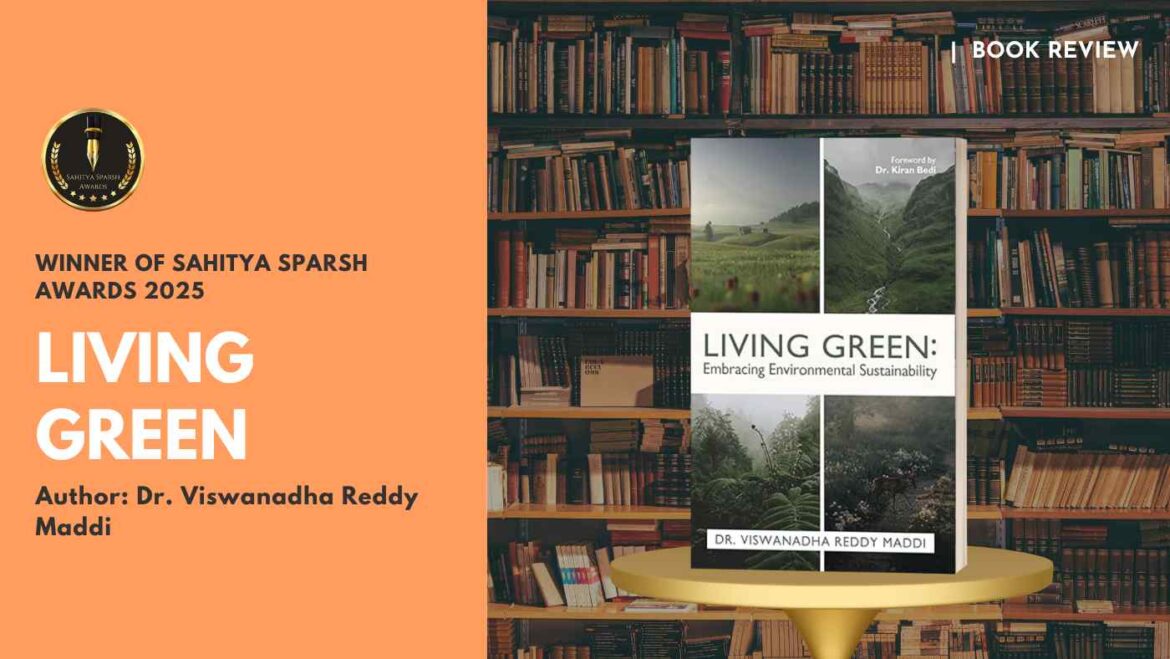“Living Green: Embracing Environmental Sustainability” by Dr. Viswanadha Reddy Maddi is a comprehensive and thought-provoking exploration of sustainability, offering readers an insightful and accessible guide to environmental stewardship. The book stands out due to its ability to seamlessly integrate theoretical sustainability concepts with practical, real-world applications, making it an invaluable resource for individuals, communities, and businesses alike. The author’s deep expertise in environmental management, coupled with his extensive professional experience in India, Qatar, and the UAE, provides a solid foundation for a wide-ranging discussion on sustainability. This book has been also a winner of Sahitya Sparsh Awards 2025.
The book begins by presenting a historical perspective on sustainability, which lays the groundwork for understanding the evolution of environmental consciousness and responsible resource management. Dr. Maddi emphasizes the importance of a holistic approach to sustainability, highlighting the interconnections between environmental, economic, and social factors. This integrated view makes the book particularly relevant in today’s global context, where sustainability is often viewed not just through the lens of conservation but also in terms of socio-economic development.
One of the standout features of “Living Green” is its ability to distill complex environmental concepts into clear, actionable steps. The author bridges the gap between awareness and action, empowering readers to implement practical solutions for a more sustainable world. Through global examples and case studies, Dr. Maddi illustrates how individuals, communities, and businesses can contribute to a greener, more sustainable future. These real-world examples not only make the book engaging but also provide readers with tangible strategies to reduce their environmental impact.
In addition to environmental conservation, Dr. Maddi also addresses the crucial socio-economic aspects of sustainability, making the book comprehensive and applicable to all stakeholders involved in environmental restoration. By focusing on the interconnectedness of ecological health, economic growth, and social equity, the author ensures that “Living Green” is not only relevant to environmental scientists but also to policymakers, business leaders, and everyday citizens seeking to make a difference.
The book’s practicality is further enhanced by its clear and concise writing style. Dr. Maddi does an excellent job of breaking down complex topics, making them accessible without sacrificing depth or accuracy. His writing is complemented by a wealth of references to scientific studies, global case examples, and the latest developments in environmental policy. This scholarly approach makes “Living Green” a useful resource for both newcomers to sustainability and professionals seeking to deepen their understanding.
In terms of its structure, the book flows logically, with each chapter building on the previous one. Dr. Maddi begins with foundational concepts, gradually moving toward more specific issues and practical solutions. This structure makes the book easy to navigate and allows readers to follow the progression of ideas without feeling overwhelmed.
The inclusion of diverse perspectives from experts in various fields adds significant value to the book. Dr. Parag Madhukar Dhakate, Chief Conservator of Forests and Special Secretary to the Chief Minister of Uttarakhand, India, praises the book for its capacity to empower readers with the knowledge and tools needed to translate sustainability awareness into tangible action. Nav Goel, an Indian Railways finance executive, echoes this sentiment, highlighting the book’s global relevance and practical applicability. Similarly, Dr. J.S. Sudarsan, a Program Head at NICMAR University, emphasizes the importance of the book’s socio-economic perspective, which makes it invaluable to various stakeholders in environmental restoration.
In his career, Dr. Viswanadha Reddy Maddi has shown a deep commitment to environmental issues, and his extensive experience in health, safety, and environmental management shines through in this work. His affiliation with various prestigious organizations, such as the International Union for Conservation of Nature (IUCN) and the Global Centre for Environmental Remediation, further attests to his credibility as an environmental expert. His credentials and affiliations lend significant authority to the book, making it a trusted guide for anyone seeking to better understand and implement sustainability practices.
“Living Green: Embracing Environmental Sustainability” is not just a book; it is a call to action. It is a timely reminder that sustainability is not an abstract ideal but a concrete set of practices that require collective effort. The book’s clear, actionable steps make it a valuable resource for anyone eager to contribute to the global movement toward environmental sustainability. Whether you are a student, a policy maker, a business leader, or simply someone interested in making more sustainable choices, Dr. Maddi’s book offers the knowledge, insight, and inspiration to begin your journey toward a greener future.
Article By: Vikram Singh Thakur
Buy Book: Amazon
